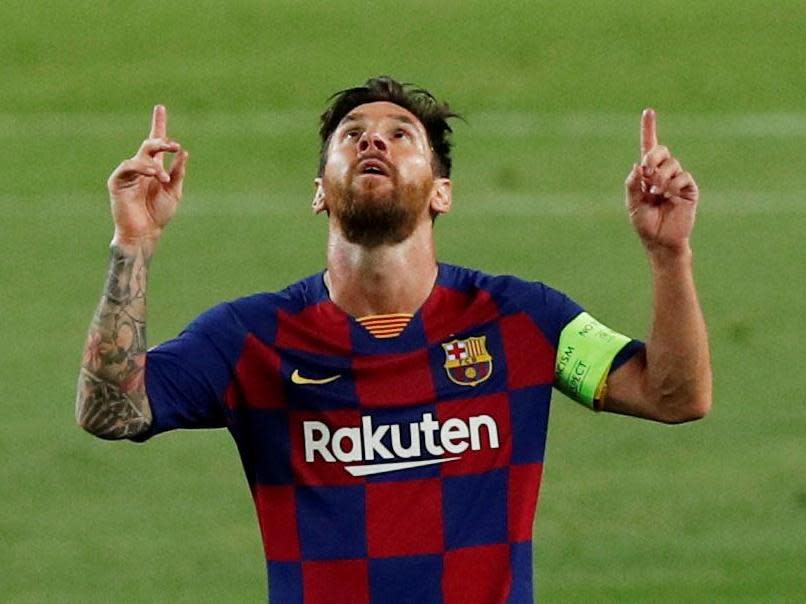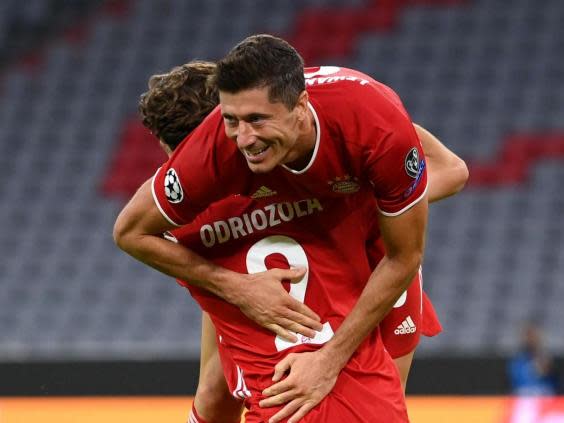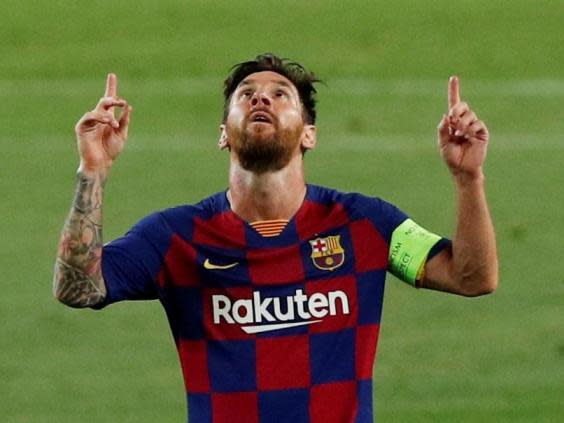Champions League’s sudden death format offers chance of a lifetime en route to immortality

As the Paris Saint-Germain players touched down in Lisbon, the excitable feeling among their squad was that this is the best chance in a decade. On the other side of their tie, and almost the other side of elite football, Atalanta feel it is the chance of a lifetime.
These are two prospects that have only been sharpened by the unique nature of the Champions League final stages this season. That nature has itself been put into further focus by the news that Atletico Madrid – who themselves see a better opportunity than ever before – have had two positive tests for Covid-19 on the eve of travel.
It is a reminder of the reality of the situation, even if it will still be business unusual, as the bubble is temporarily disrupted.
A bubble is very much what this is in a football sense as much as a “bio-secure” sense, and it is why the very format may be so influential to how this season’s Champions League ends.
Never has a major European club competition been so self-contained, with no other interference from outside.

That is why Pep Guardiola’s comment that it’s “like a World Cup” is perfect. That’s exactly what it is.
“Now every game is a final,” the Manchester City manager said. “You are in, or you are out.”
You are also in a structure that instantly balances the odds a bit more for weaker or off-form teams as well as for managers – like Diego Simeone – adept at game-management.
The normal Champions League is obviously a knock-out competition as well, where the best team only occasionally wins, but its two-legged nature means the better team will win more often. The extra fixture inherently means superiority has more chance to assert itself, and is less susceptible to wild swings of fortune or one bad night. That is now the case now though.
There are no second legs, and thereby no second chances, with any single kick or performance potentially having much greater consequence. Clubs have to set themselves for these games in a very different way. They would normally prepare for a first leg in relation to the second leg, and ready themselves for the second leg around the result of the first leg. Consider Guardiola’s customary second-guessing of himself for such ties. There are all manner of domestic concerns on top of that.
There is now only an enticing purity.
Whatever about a final, every individual game will be an ending for someone. Sudden death en route to immortality.
It is one game at a time, one step at a time, with every match the absolute centre of a clubs’ world in a way that is usually impossible.
This is why Atalanta, as well as RB Leipzig and Lyon, feel so emboldened. They know putting everything into one game can bring more glory than they’ve ever imagined.
Lionel Messi feels emboldened for another reason. Robert Lewandowski, Kylian Mbappe, Neymar and Kevin De Bruyne should be thinking the same way.
In one-off games, any one player can have a much greater influence. A big moment, or performance, can be enough. It is why World Cups have a much more distinctive history of individual players defining and dominating single tournaments than the Champions League. Messi has been reminded of this for most of his career. He is now determined to individually dominate this most singular of Champions Leagues. No player left in the Champions League has influence like him, or is capable of performances or moments like him.
It may well be the great leveller in Barcelona’s quarter-final with Bayern Munich, and perhaps the difference.

It is difficult not to think the German champions are the better side right now, after all. They may be far better, as well as the best left in the competition.
That superiority, however, can be entirely undone with one run. There was already an ominous sign of this in the last 16, when Messi conjured an ingenious goal against Napoli out of almost nothing, as well as a fall.
Bayern will have to shape their approach around him. That’s his gravitational effect.
That fixture is probably the pick of the quarter-finals, and certainly is in terms of names, but also represents another reason why the format makes PSG and Atletico even more confident.
They’re on the more forgiving side of the draw. The regular Champions League often operates on brackets, with series of rounds drawn at the same time, but it is not as intense as this situation where one game is so influenced by the fixture that came directly before it. That can matter. The cumulative effect of this has been seen in World Cups. Italy arrived at the finals of 1970 and 1994 utterly fatigued, having come through a series of gruelling games in such a short time.
This isn’t to disrespect Leipzig or Atalanta, but the reality is that managers would prefer to avoid the super-clubs, rather than relative novices who may be stretching themselves.
The other side of the draw has opened a bit more since Lyon eliminated Juventus and Cristiano Ronaldo, but the competition as a whole has opened up in another way.
For one, the 2019-20 champions of England, Spain and Italy are all gone.

Secondly, there are only two clubs left who have ever won a Champions League, and both – Barca and Bayern – meet in the one match. With a total of 10 European Cups between them, it is the lowest among the competition’s eight quarter-finalists since 2008.
The competition is at least set up for its first new winners since 2012, and just the second of the Champions League era. Only Chelsea and Borussia Dortmund have broken into the club since. Six of these clubs await. There is similarly the possibility of a semi-final line-up featuring Atalanta, Leipzig and Lyon, although their very presence here already fosters a sense of freshness.
The competition, however, is also set up for something very different entirely; something that speaks to a depressingly predictable future.
We could well have a final between PSG and City, that would also be a final between two states, who are currently either side of an economic cold war. The football would only be another part of that stand-off.
That is where the modern game has been heading for some time. There is even a strong argument the Champions League itself has become, overall, a negative influence on the sport. The amount of money in it, and the unequal distribution of that money, are one of the main factors driving a hugely destructive financial disparity in football. You could even say this whole situation, unavoidable as it is, offers another depressing image of the game’s eventual destination: super-clubs playing in exclusive competitions in sterile and soulless conditions. This may be what a super league looks like.
To quote Guardiola, “you are in, or you are out”.
And yet the superb level of football is also what makes it so seductive. It is why, like all of the teams in Lisbon this week, it’s impossible not to feel excited. The sudden-death nature, amid the world’s real difficulties, make it feel so alive.

